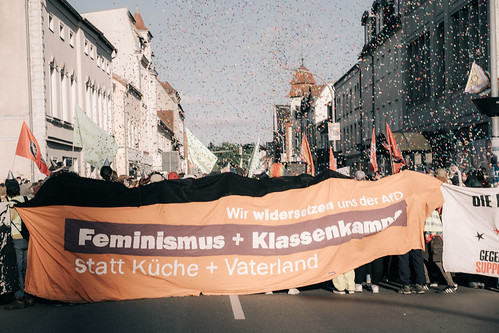In a tweet in early February, George Galloway claimed he stands ‘for the workers, not the wokers’. He was recently elected as MP for Rochdale in Northern England, as a representative of the Workers Party of Britain; a hard-left party, founded by Galloway himself, that strongly opposes the ‘woke left’, and promises to combat ‘increasingly unhinged identity politics’.
The word woke, once used within Black communities to draw attention to inequalities and racially motivated threats, has been weaponized by the right wing around the world. It is used pejoratively to refer to a wide range of ‘liberal’ ideals; ranging from the serious to the deeply trivial. The word’s original meaning has been essentially erased, coming to stand for anything vaguely left-leaning or politically correct, especially when it comes to identity politics.
The debate surrounding ‘woke’ culture has escalated so massively that many on the left are tired of its constant discussion, or also feel that things have gone too far, and politicians like Galloway are jumping on the woke-bashing bandwagon to win over these voters.
Yet, who exactly are the ‘wokers’ Galloway scorns? They are reminiscent of the populist enemy number one, the Metropolitan Elite. This mystical group of globalised, flat-white-drinking city slickers have long been the target of right-wing politicians, as they supposedly attack institutions like the traditional family, the dairy industry, and the very concepts of nationality and gender.
In a YouTube video titled ‘Sick of the woke left’, Galloway condemns the ‘woke madness’ in Scotland that he believes has been imported from the US, and is met with hundreds of comments of support. But does he actually believe that the ‘wokers’ are Britain’s biggest issue? It is thought that Galloway won the (formerly Labour) seat in Rochdale primarily due to his strong pro-Palestinian stance, so it’s hard to determine how much his party, or his constituents, care about this fight against the ‘woke’.
Galloway has long been a controversial figure of British politics – be it his infamous meeting with Saddam Hussein, or his play-acting as a cat on Celebrity Big Brother. Yet, cancel culture doesn’t seem to have particularly damaged his career, and try as they might, mainstream British politics cannot seem to get rid of him.
In Germany, an equally divisive figure has attempted to mix leftist fiscal policy with populist-leaning, anti-PC rhetoric. Sahra Wagenknecht – a prominent former member of Die Linke – founded her own party (BSW) in January 2024, promising a combination of pro-Russia foreign policy, strict immigration laws, and left-leaning economics. She claims that leftist politics have become more about gender, race and ‘lifestyle’, as opposed to issues such as pensions, wages and the social state, and her party aims to combat this.
For voters in Germany who feel angered by ‘woke’ culture and the ‘elites’, Wagenknecht’s new party could offer an alternative to the far-right AfD, which is also strongly opposed to PC culture (co-chair Alice Weidel has said that political correctness belongs in the ‘dustbin of history’). If these issues are going to swing elections, then it is arguably better, from a pragmatic point of view, to choose the lesser of two evils – socially right and fiscally left vs. socially right and fiscally right. Yet, Wagenknecht’s BSW party is new, its politics are shaky, and only time will tell how successful it will be in June’s EU elections and September’s local elections in Thuringia, Saxony and Brandenburg.
(Galloway has shown his support of Wagenknecht, responding to a video of her calling for an end to German military aid to Ukraine with a tweet saying ‘This woman is the only sane future for Germany’.)
In Westminster, ‘woke’ is no longer just an alluded-to concept, but rather unironic terminology used in Parliament. Former GB news presenter Esther McVey now serves as the Minister of State without Portfolio – yet is unofficially known as the ‘common sense tsar’, dedicated to fighting the ‘scourge of wokery’. Though this may sound like a quest from the Lord of the Rings, it shows how desperately the Tories are clinging to the battle against ‘woke’ as a last-ditch attempt to win voters before the General Election.
Perhaps the most polarising topic under the ‘woke’ umbrella is trans rights. In February, Rishi Sunak’s joke in Parliament about trans women was strongly criticised by Keir Starmer, as the mother of murdered trans teenager Brianna Ghey was present. Through mere critique, Starmer gained a temporary moral high ground without having to do anything material to benefit trans individuals, demonstrating perfectly how these debates and arguments are often just empty words, designed to create and then soothe moral panics.
It can feel like contemporary Western politics is drowning in culture wars, with social issues, many of which only affect a small minority of the population, taking up enormous amounts of space – be it in the media, the Bundestag or the House of Commons. Regardless of personal opinion, it is clear that these issues are utilised as political weapons, aimed to divide and polarise, to win over voters who care more about tangible social issues than they do more abstract economic ones.
The continued attacks against ‘wokeism’, and its constant discussion at the expense of more pressing matters, are just contributing to the noise, adding fuel to the culture war fire. Perhaps the only way to combat ‘woke’, ‘wokers’ or ‘wokery’ (take your pick) is simply to retire these phrases from political debate once and for all.




